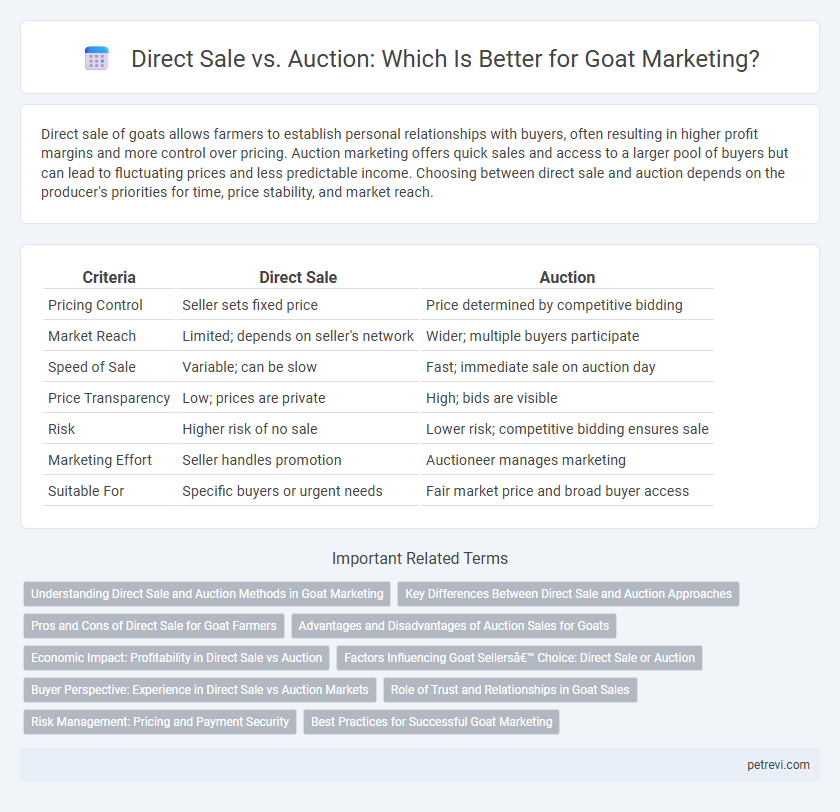Direct sale of goats allows farmers to establish personal relationships with buyers, often resulting in higher profit margins and more control over pricing. Auction marketing offers quick sales and access to a larger pool of buyers but can lead to fluctuating prices and less predictable income. Choosing between direct sale and auction depends on the producer's priorities for time, price stability, and market reach.
Table of Comparison
| Criteria | Direct Sale | Auction |
|---|---|---|
| Pricing Control | Seller sets fixed price | Price determined by competitive bidding |
| Market Reach | Limited; depends on seller's network | Wider; multiple buyers participate |
| Speed of Sale | Variable; can be slow | Fast; immediate sale on auction day |
| Price Transparency | Low; prices are private | High; bids are visible |
| Risk | Higher risk of no sale | Lower risk; competitive bidding ensures sale |
| Marketing Effort | Seller handles promotion | Auctioneer manages marketing |
| Suitable For | Specific buyers or urgent needs | Fair market price and broad buyer access |
Understanding Direct Sale and Auction Methods in Goat Marketing
Direct sale in goat marketing involves selling goats directly to consumers or retailers, enabling price negotiation and establishing customer relationships. Auction methods rely on competitive bidding, often resulting in faster sales and transparent price discovery based on real-time supply and demand. Understanding both approaches helps producers optimize revenue and meet market preferences effectively.
Key Differences Between Direct Sale and Auction Approaches
Direct sale in goat marketing involves selling goats directly to buyers, allowing for personalized negotiation on price and terms, often resulting in higher profit margins for sellers. Auction methods aggregate multiple buyers and sellers, creating a competitive environment that can drive prices up but may also lead to lower final sale prices due to bidding dynamics and market fluctuations. Key differences include the level of price control, transaction speed, and buyer-seller interaction, with direct sales offering greater control and auctions providing market-driven pricing and faster turnover.
Pros and Cons of Direct Sale for Goat Farmers
Direct sale allows goat farmers to establish personal relationships with buyers, ensuring better price control and immediate payment, which improves cash flow. This method reduces marketing costs and eliminates commission fees typically associated with auctions, but it requires more effort in finding and negotiating with buyers. However, direct sales can limit exposure to a broader market, potentially resulting in lower demand or prices compared to competitive bidding at auctions.
Advantages and Disadvantages of Auction Sales for Goats
Auction sales for goats offer a transparent pricing mechanism where market demand directly influences sale prices, often resulting in competitive bidding that benefits sellers. However, auctions may expose sellers to price volatility and require animals to be transported to centralized locations, potentially causing stress to goats and additional logistical costs. Unlike direct sales, auctions limit the ability to negotiate terms or build long-term buyer relationships, which can impact seller flexibility and profit margins.
Economic Impact: Profitability in Direct Sale vs Auction
Direct sale of goats often leads to higher profitability by eliminating intermediaries, allowing farmers to set competitive prices and retain greater revenue per animal. Auctions provide a faster turnover but typically result in lower prices due to competitive bidding and market fluctuations, reducing overall profit margins. Economic impact analysis shows direct sales maximize farmer income, while auctions offer liquidity but less price control.
Factors Influencing Goat Sellers’ Choice: Direct Sale or Auction
Goat sellers often decide between direct sale and auction based on factors such as price certainty, speed of transaction, and access to buyers. Direct sales typically offer higher price control and quicker negotiations, while auctions provide competitive bidding that can increase final sale prices but carries the risk of volatility. Market demand, goat quality, and seller urgency play critical roles in determining the optimal marketing channel for livestock sales.
Buyer Perspective: Experience in Direct Sale vs Auction Markets
Buyers in direct goat sales often benefit from personalized interactions, enabling detailed inquiries about breed, health, and care practices, which enhances confidence in the purchase. Auction markets provide competitive pricing and a broader variety of goats in a shorter time, but the fast-paced environment may limit the buyer's ability to thoroughly assess individual animals. Decision-making in goat marketing depends on whether buyers prioritize price transparency and selection speed or prefer informed, relationship-driven purchases.
Role of Trust and Relationships in Goat Sales
Trust and strong relationships between sellers and buyers play a crucial role in direct sale goat marketing, ensuring transparency and long-term business connections. Direct sales foster personalized interactions, allowing sellers to demonstrate the quality and health of goats, which builds buyer confidence and loyalty. In contrast, auctions prioritize competitive bidding but often lack the individual trust and relationship-building opportunities fundamental to sustained goat trade success.
Risk Management: Pricing and Payment Security
Direct sale of goats minimizes pricing uncertainty by enabling fixed-rate agreements between buyers and sellers, enhancing payment security through immediate transactions or secured payment methods. Auction marketing introduces price volatility due to competitive bidding, increasing risk exposure but potentially maximizing sale value in strong demand conditions. Effective risk management in goat marketing requires balancing direct sale's predictability against auction's market-driven pricing dynamics to optimize financial outcomes and payment assurance.
Best Practices for Successful Goat Marketing
Direct sale of goats allows farmers to establish personal relationships with buyers, ensuring better price negotiation and customer loyalty. Auction marketing offers quick turnover and access to a broader market but demands understanding of timing and bidding dynamics to maximize profits. Combining both methods strategically, emphasizing quality breeding and health certification, enhances market credibility and drives successful goat sales.
Direct Sale vs Auction for Goat Marketing Infographic

 petrevi.com
petrevi.com